Table of Contents
Did you know that popcorn, a favorite movie night snack, contains chemicals linked to cancer? Current studies are pointing fingers at over a dozen other popular foods, many of which are also beloved treats or daily staples.
In the battle against cancer, prevention is crucial. While genetics and environmental factors significantly contribute to cancer development, dietary choices also play a vital role.
In this article, we will delve into 16 foods known for their cancer-causing potential, explore the specific chemicals responsible, and discuss the worst dietary choices during cancer treatment. Additionally, we’ll offer practical tips on how to avoid these harmful elements in your diet.
16 foods that can cause cancer
In cancer prevention, understanding the types of cancer-causing foods is essential. These are the foods that are known to contain carcinogenic substances or create conditions that help cancer development.
So, what foods cause cancer? From red meats to sugary drinks, the list of cancer-causing foods encompasses a wide range of dietary staples:
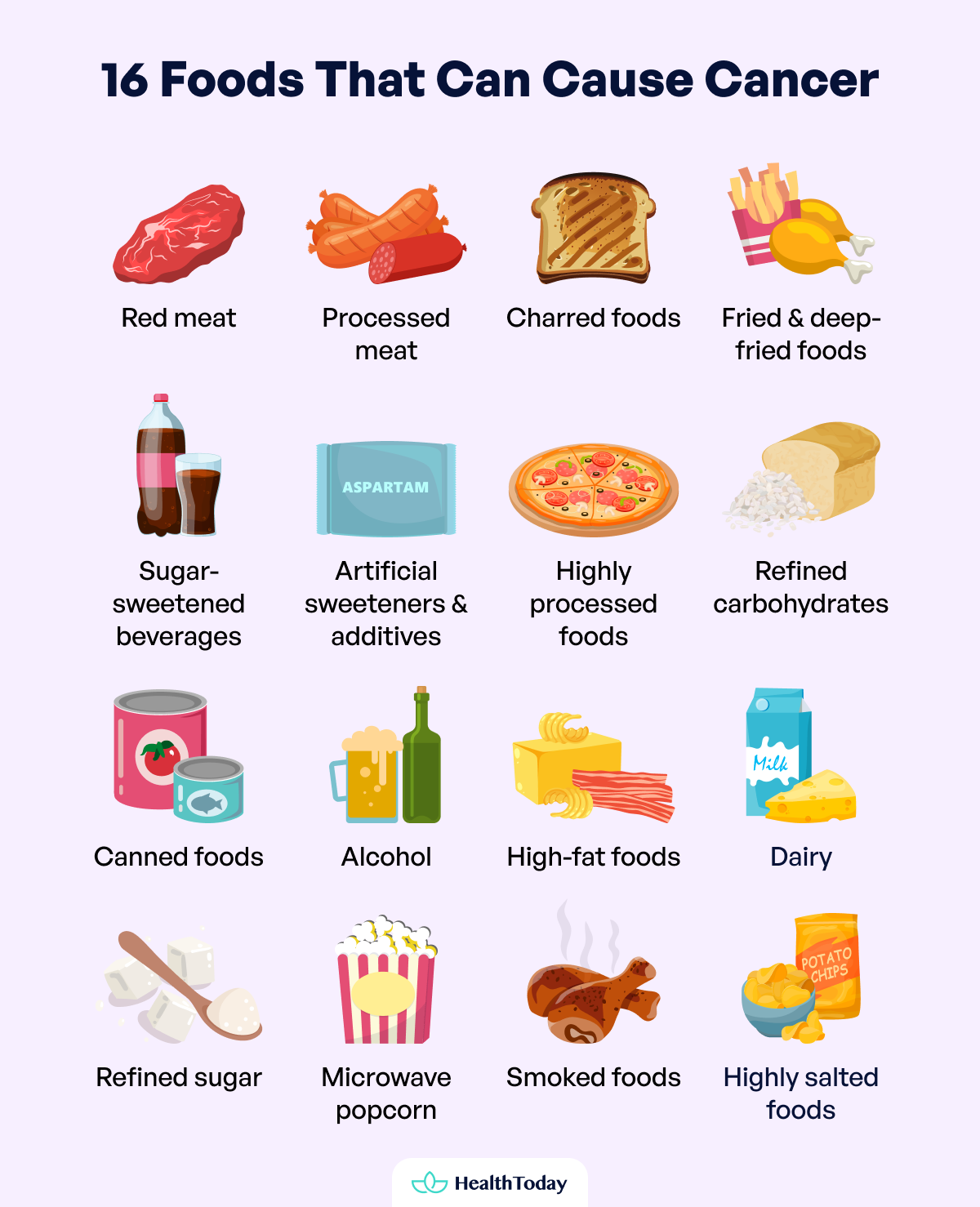
1. Red meat
High intake of red meat is often associated with an increased risk of certain cancers, especially colorectal cancer (1, 2). Red meat includes beef, pork, lamb, mutton, horse, and goat. However, there is only limited evidence about this correlation. Therefore, the WHO’s International Agency for Research on Cancer (IARC) classified red meat as “probably carcinogenic to humans”, rather than definitively carcinogenic (3).
2. Processed meat
Processed meats like bacon, sausages, ham, salami, hot dogs, and deli meats undergo preservations such as smoking, curing, or adding preservatives. According to IARC, they are classified as class 1 carcinogen foods. Even a 50 g intake of it potentially elevates the risk of colorectal cancer by 20 percent (4). Studies also indicate links to other cancers, such as those affecting the digestive system and liver (5, 6).
3. Sugar-sweetened beverages
Regular intake of sugary drinks has been linked to obesity and insulin resistance, which is often associated with the risk of overall cancer development (7).
One study found that for every extra 3.5 oz of sugary drinks consumed daily, there’s an 18 percent higher risk of developing any type of cancer, including a 22 percent increased risk of breast cancer (7, 8).
Another study found that the intake of regular soft drinks, known to be high in sugar, increased the risk of bladder cancer (10). However, the results are still inconsistent, and the causal nature is not fully understood. Further research is needed before drawing definitive conclusions.
4. Fried and deep-fried foods
Some case-control studies suggest a potential link between fried foods and various cancers, including gastric and prostate cancers (11, 12, 13).
During the frying process, food’s chemical composition and the oils undergo alterations that can potentially generate carcinogenic substances, such as acrylamide and heterocyclic amines (14). However, further research is needed, taking into account factors like cooking methods and individual dietary habits.
5. Charred foods
Charred or burnt food usually has a browning characteristic due to the formation of acrylamide in the cooking process. The presence of acrylamide, along with heterocyclic amines (HCAs) and polycyclic aromatic hydrocarbons (PAHs), raised concerns about the cancer-causing effects. Moreover, some studies show a potential link between charred foods and certain types of cancer (15, 16).
6. Artificial sweeteners and additives
Some artificial sweeteners have been linked to cancer in animal studies. Aspartame and acesulfame-K are some of the sweeteners linked with increased cancer risk (17). Certain food additives emulsifiers, such as sodium citrate, xanthan gum, and mono- and diglycerides of fatty acids, were also linked to a higher risk of overall cancer (18). However, the evidence remains inconclusive.
7. Canned foods
The food may not be the problem, but some canned foods may contain chemicals linked to cancer and other health issues. One such chemical is furan. Although its effects on humans are limited, the International Agency for Research on Cancer (IARC) classified it as possibly carcinogenic (13, 19). Bisphenol-A (BPA) is another chemical found in canned food associated with breast tumor growth (20).
8. Alcohol
Excessive alcohol consumption might be a risk factor for various cancers, such as those in the liver, breast, mouth, and colon (21, 22). The available evidence indicates that alcoholic beverages of various kinds have a similar impact on the risk of developing cancer (22). However, the connection between alcohol consumption and cancer remains uncertain and needs more substantial evidence.

9. Highly processed foods
Consuming ultra-processed foods (UPFs) is linked to higher cancer risk due to their possible contaminants, poor nutritional quality, and high in sugar, salt, and fats (23). Some studies suggest an association between UPF intake and overall cancer risk, particularly breast, prostate, and colorectal (24, 25). Increasing the consumption of UPF by 10 percent may lead to higher cancer-related deaths (26).
10. Refined carbohydrates
Refined carbohydrates, such as those found in white bread, white rice, and sugary snacks, undergo extensive processing that removes their fiber, vitamins, and minerals (27). Although the correlation isn’t established yet, studies have linked refined grain consumption to an elevated risk of colon and gastric cancer. On the other hand, consuming whole grains reduces the risk of cancer (28, 29).
11. High-fat foods
High-fat diets have been contributing to numerous cancer causes. High-fat diets containing saturated and trans fats have been found to increase inflammation, thus increasing breast and prostate cancer growth (30, 31).
Yet, the connection between a high-fat diet and its role as a risk factor for breast cancer remains open-ended. Not all current research findings show a strong association between the two.
12. Dairy
The evidence regarding dairy consumption and cancer risk is mixed (32). There is concern about the potential risk of prostate cancer associated with very high levels of dairy consumption (32, 33, 34). However, there’s no specific recommendation from the American Cancer Society regarding dairy consumption for cancer prevention. Certain research even suggests that dairy products may help prevent some cancer risks, including colorectal and breast cancer (35, 36).
13. Refined sugar
Diets high in refined sugars have been linked to obesity, insulin resistance, and inflammation, all of which are risk factors for cancer development. Some studies suggest that high total sugar intake—especially added sugar, such as sucrose, fructose, and maltose—is associated with increased breast, bladder, and small intestine cancer, as well as leukemia (37, 38).
14. Microwave popcorn
Certain research has raised concerns about the potential association between microwave popcorn consumption and the presence of cancer-causing chemicals. Some of the highly mentioned chemicals are PFOA (perfluorooctanoic acid) and PFOS (perfluorooctane sulfonic acid). These chemicals have been linked to a range of health problems, including cancer risks, such as breast and rectal (39, 40, 41). It is recommended to save microwavable popcorn for only the occasional treat (42).
15. Smoked foods
Consuming smoked foods may increase the risk of cancer due to the formation of toxic compounds like polycyclic aromatic hydrocarbons (PAHs) during the process. PAHs are linked to a higher risk of some cancer types (43). Major sources of PAHs include cheese, fish, and meat smoked over an open flame.
In addition, nitrosamines, also found in smoked meats and salted fish, are known carcinogens linked with gastric cancer risk, especially in diets high in preserved foods and low in fresh produce (44, 45).
16. Highly salted foods
The relationship between excessive intake of salt and salted food with cardiovascular diseases, strokes, and gastric cancer is well known (46, 47). High salt intake, including salt-preserved food, may also be linked to a higher risk of nasopharynx cancer (44). What is more, this may also increase the risk of stomach cancer, possibly due to its role in damaging the stomach lining (45).




Cancer-causing chemicals in food
As we delve into the intricacies of cancer prevention and the role of dietary choices, it becomes crucial to explore the presence of cancer-causing chemicals in our food.
While many foods provide essential nutrients for our bodies, some may present significant health risks when you consume them regularly. Understanding these potential hazards is needed to make informed choices about what we eat.
Ethanol
Alcoholic beverages, including fermented and distilled types, have been linked to cancer development in humans. The reason behind that is the ethanol presence in those beverages.
Various studies have consistently shown associations between alcohol consumption and cancers of the mouth, the throat, and possibly the breast and liver (46, 47, 49). The risk of cancer appears to increase with higher alcohol consumption, especially among tobacco users (50).
HCAs and PAHs
HCAs and PAHs form when muscle meat, including beef, pork, fish, or poultry, is cooked at high temperatures. Oils and coffee can contain low levels of PAHs (51, 52). The formation of HCAs and PAHs varies depending on factors like meat type, cooking method, and level of doneness (rare, medium, or well done) (51).
Animal studies show that different ways of being exposed to PAH can lead to various tumor development (53, 54). However, human data on HCA and PAH intake are limited, but some recent studies suggest a link to cancer risk (56). The reasons behind this link are the mutagenic characteristics of both chemicals.
Acrylamide
Dietary exposure to acrylamide depends on factors like food acrylamide levels, portion size, consumption frequency, and cooking or storage methods. You can find this chemical in groceries and drinks you consume on a daily basis. Common sources include coffee, fried/baked potatoes, and bakery goods (57).
Research has investigated its potential association with cancers affecting different organs, including the reproductive system, gastrointestinal tract, kidneys, lungs, and brain (58, 59, 60, 61). However, it can be said that the evidence still remains incomplete.
N-nitroso compounds
Another commonly found carcinogenic compound is N-nitroso compounds, which form in smoked, salted, and pickled foods cured with nitrate or nitrite. Sodium and potassium nitrates are also commonly used to give hot dogs and luncheon meats their characteristic pink color (62).
Some research reported links between consuming foods rich in nitrosamines, nitrites, and nitrates with various cancer types. These cancers include the ones affecting the gastrointestinal tract (esophageal, gastric, colorectal), pancreas, and bladder (63, 64).
5 worst foods for cancer treatment
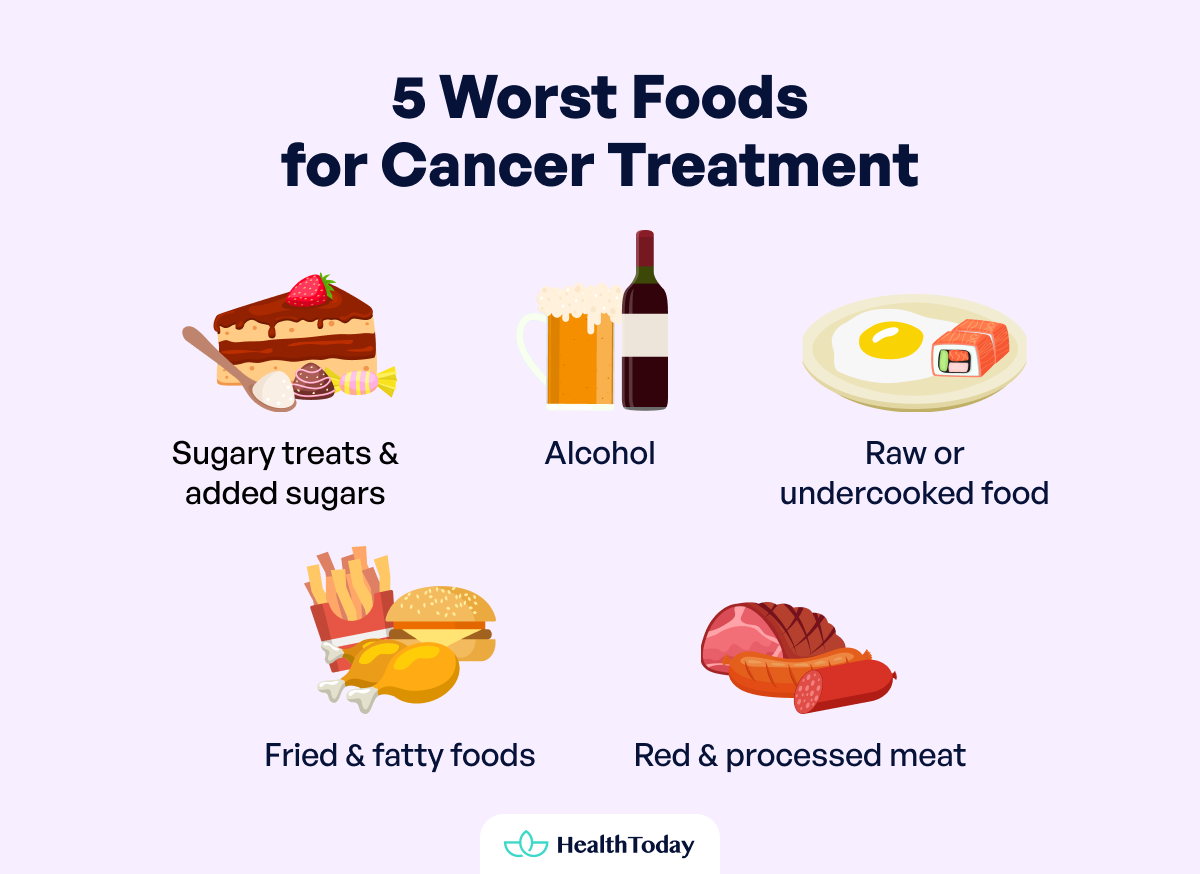

While undergoing cancer treatment, you must prioritize nutrient-dense foods that support healing and recovery. On the other hand, certain foods should be cautiously approached due to their potential to interfere with therapy or worsen symptoms.
Here are some of the foods that should be avoided during cancer treatment:
- Sugary treats and added sugars
Excessive sugar intake may induce stress in your body, as stress levels can increase blood sugar levels and weaken immune function (65). However, although sugar itself doesn’t directly fuel cancer growth, it’s wise to limit added sugar intake.
Consuming foods and drinks containing added sugar, such as soda, sweet tea, candy, and baked goods, should be moderate. Overindulging in added sugar triggers the body to increase insulin production, which can have negative effects on health (66).
- Alcohol
In cancer treatment, you should limit alcohol because of its negative effects on chemotherapy and treatment side effects (67). Drinking after the diagnosis can increase the risk of cancer recurrence and secondary tumors (68). The patient’s condition may also worsen due to the combination of smoking and alcohol intake during radiation therapy (69, 70).
- Raw or undercooked food
Some chemotherapy aims to eliminate cancer cells, which can unexpectedly affect immune cells, resulting in immune suppression (71). For individuals with compromised immune systems, consuming raw or undercooked foods increases the risk of foodborne illnesses, which can be dangerous during cancer treatment (72).
Therefore, during cancer treatment, you should prioritize the consumption of thoroughly cooked foods, particularly animal-based products like meat, eggs, fish, and poultry.
- Fried and fatty foods
During cancer treatment, you should also limit fried and fatty foods, especially those containing hydrogenated oils. Such foods include fast food, chips, onion rings, fried donuts, and nuggets.
These foods are often filled with unhealthy trans fats and lack the essential nutrients, carrying potential risks to individuals who are undergoing the treatment. Consuming fried foods can worsen inflammation within the body and impact its ability to heal effectively during cancer treatment (73).
- Red and processed meat
The American Cancer Society advised limiting red and processed meat during the cancer treatment (74). Some examples of this food are beef, pork, lamb, bacon, sausage, pepperoni, jerky, and corned beef.
Besides their harmful additives and preservative content, they are often high in saturated fats. Saturated fats may promote inflammation (75) and compromise the immune system, hindering cancer treatment.




Tips to eat less cancer-causing foods
In light of the growing body of evidence linking diet to cancer risk, it’s essential to adopt strategies to avoid cancer-causing foods. By being mindful of what we eat and making informed choices, we can take proactive steps to reduce our risk of developing cancer.
Here are some tips to help avoid these harmful foods and support overall health and well-being.
- Read labels: Pay attention to ingredient lists and avoid products with additives, preservatives, trans fat, high levels of sodium or sugar, and artificial sweeteners.
- Choose whole foods: Opt for whole, unprocessed foods like fruits, vegetables, lean proteins, and whole grains.
- Limit processed food and meat: Choose lean cuts of meat and poultry, and limit consumption of processed food and meats, especially charred ones.
- Cook safely: Use gentler cooking methods like steaming, boiling, or baking, and avoid charring or overcooking foods.
- Go organic: When possible, opt for organic produce to minimize exposure to pesticides and other harmful chemicals in fruit and vegetables. Choose pasture-raised meats to minimize exposure to pesticides, hormones, and antibiotics.
- Stay hydrated: Drink plenty of water throughout the day to support detoxification and overall health. Choose herbal teas over sugary drinks and alcohol.
- Incorporate cancer-fighting foods: Consuming food containing phytochemicals like berries and leafy greens, omega-3-rich fish, and probiotics may help in reducing cancer risk (76, 77, 78).
Are there carcinogens in vegetables?
While vegetables themselves are not carcinogenic, certain farming practices may introduce pesticides and chemicals that lead to health issues. Choosing organic or locally grown produce can help minimize exposure to those potential carcinogens.
Do chips cause cancer?
Chips and other fried or highly processed snacks often contain acrylamide, a chemical formed during high-heat cooking processes, which is classified as a potential carcinogen. Limiting consumption of these foods may help reduce cancer risk.
What is the link between tomatoes and cancer?
Tomatoes contain lycopene, a powerful antioxidant linked to a reduced risk of certain cancers, particularly prostate cancer (79). Consuming tomatoes alone is not a guarantee against cancer since an overall diet plays a role in cancer prevention. However, including tomatoes in a balanced diet may offer protective benefits against cancer.
What is the number 1 cancer-fighting food?
There is no single “miracle” food that can prevent cancer. However, a diet rich in fruits, vegetables, omega-3-rich fish, whole grains, and lean proteins is recommended. These foods provide needed nutrients and antioxidants that support overall health and may help reduce cancer risk.
What starves cancer cells?
Some research suggests that a ketogenic diet, low in carbohydrates and high in healthy fats, may starve cancer cells by cutting off glucose, their main energy source (80, 81). However, more studies are needed to fully understand and support their effectiveness. Focusing on a balanced diet that supports overall health and immune function is key to reducing cancer risk and supporting treatment outcomes.
Summary
Being mindful of our dietary choices is crucial in cancer prevention. The identified 16 cancer-causing foods to avoid and the presence of cancer-causing chemicals in food serve as a practical guide in making informed decisions about our daily nutrition. By actively staying away from the foods that cause cancer, particularly those listed as the worst foods for cancer, we contribute to our overall well-being and play an active role in cancer prevention.





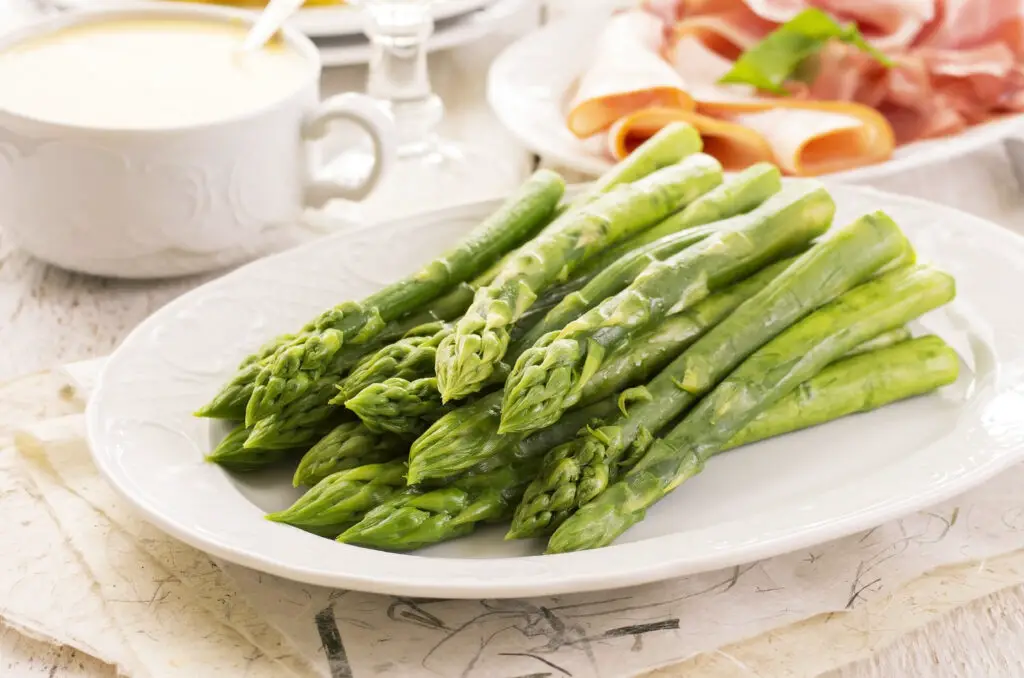
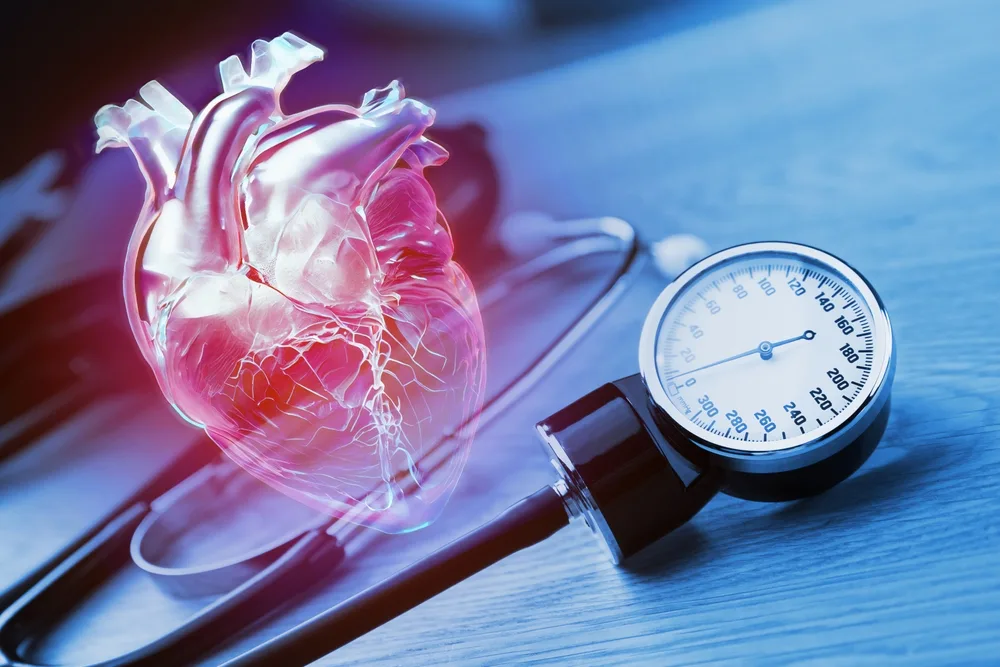
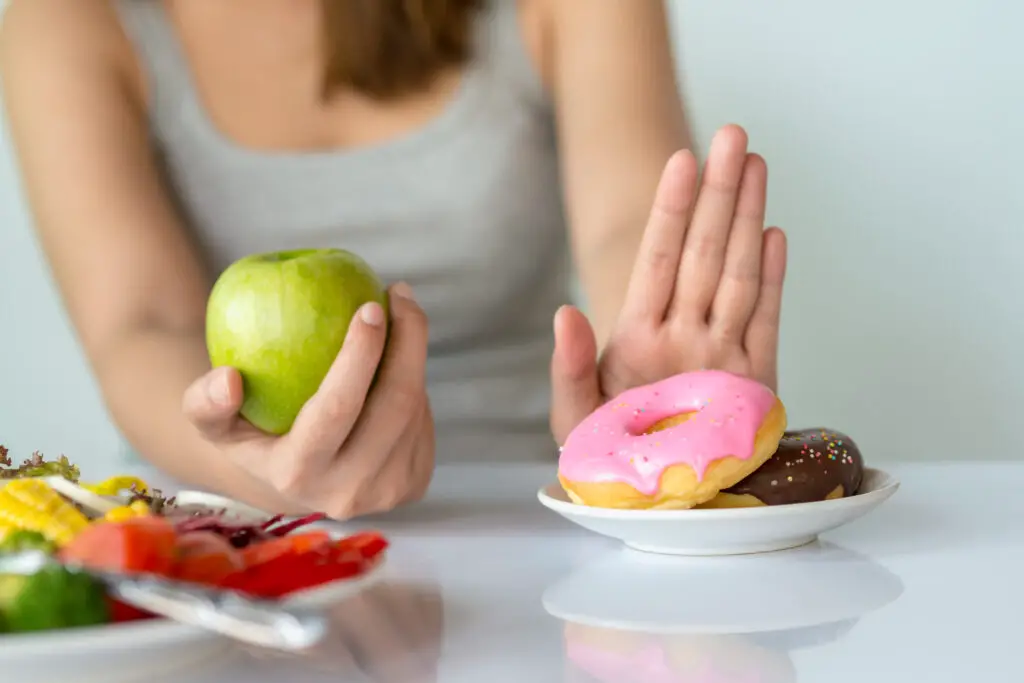

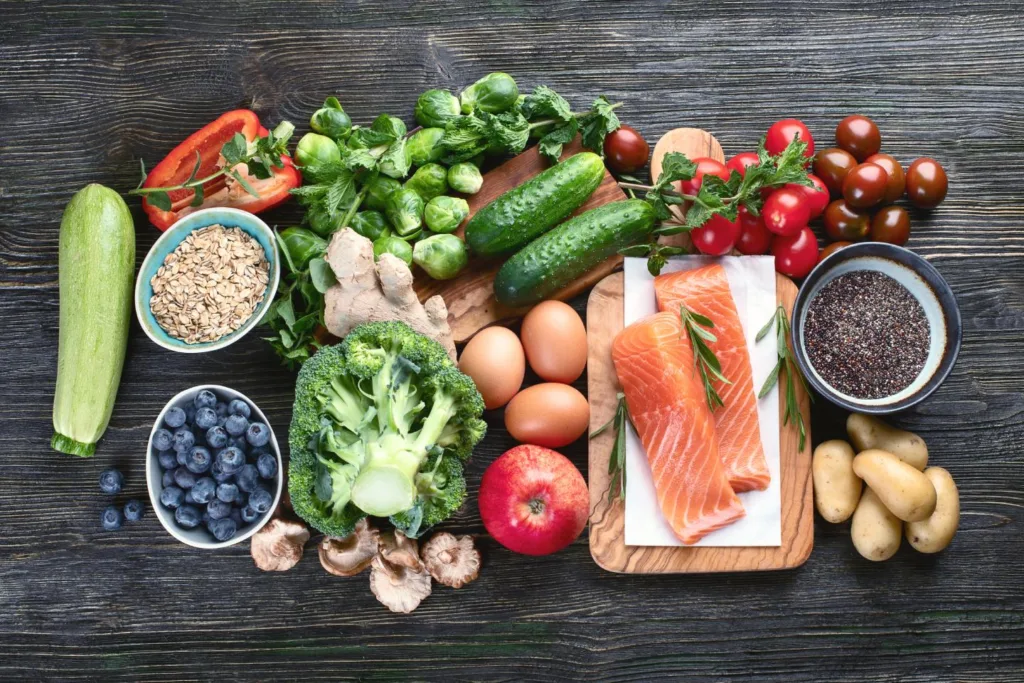
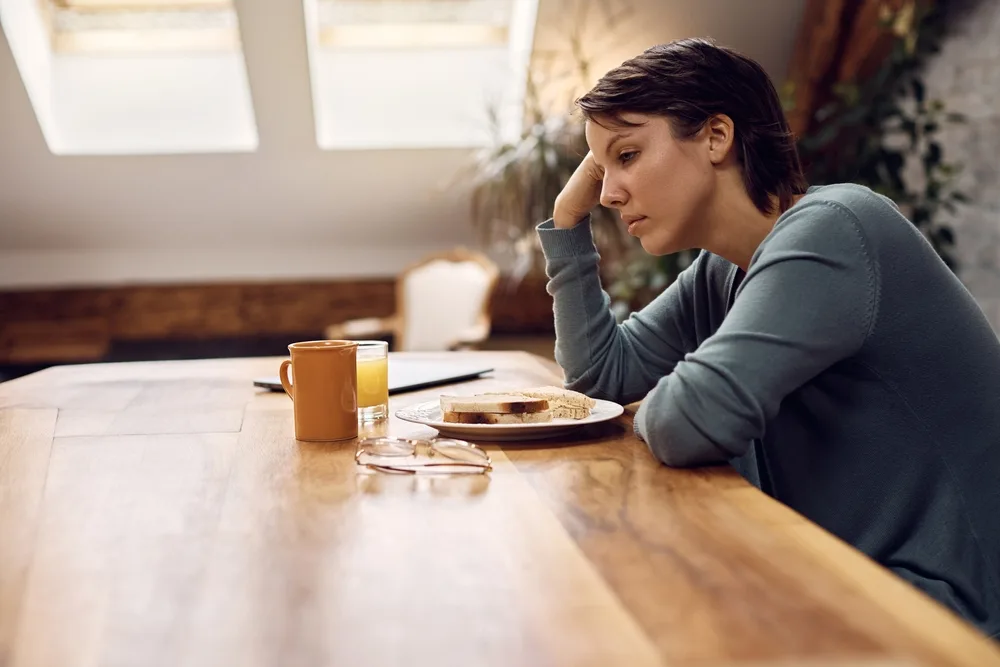

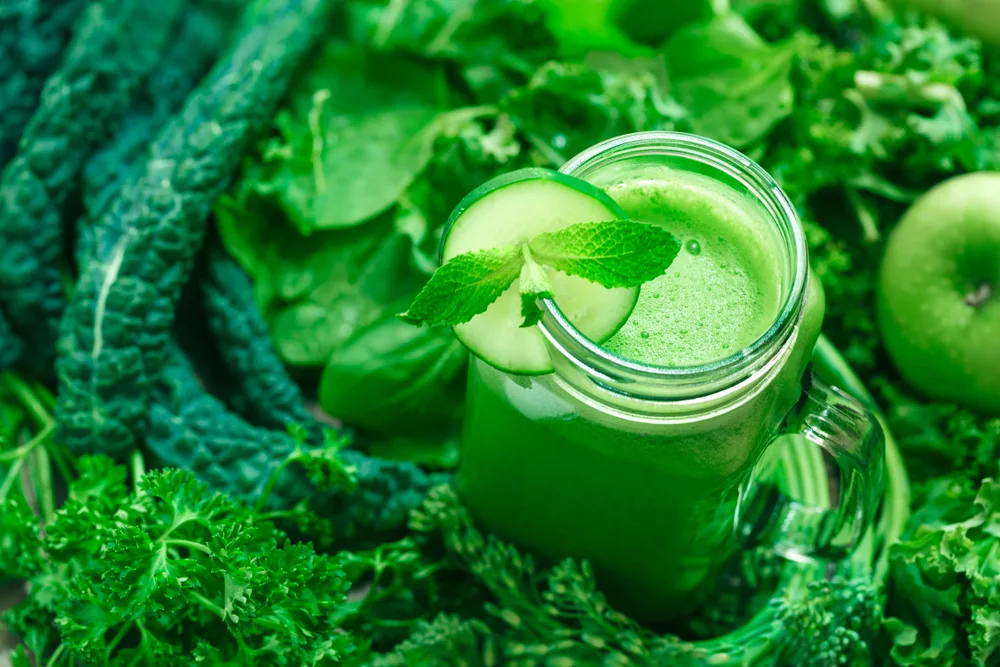
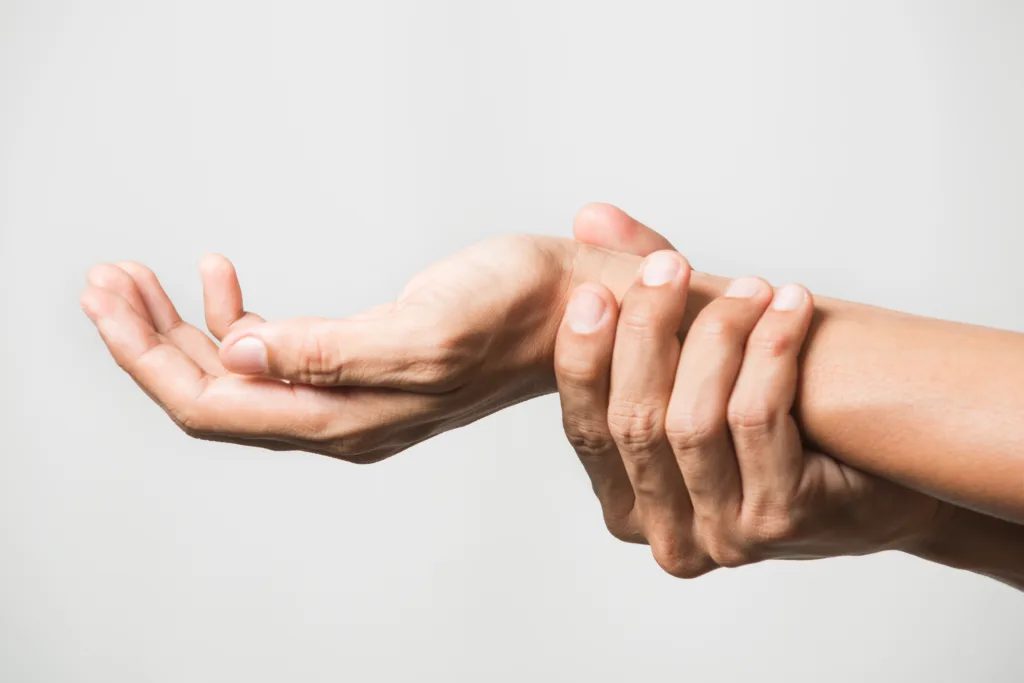
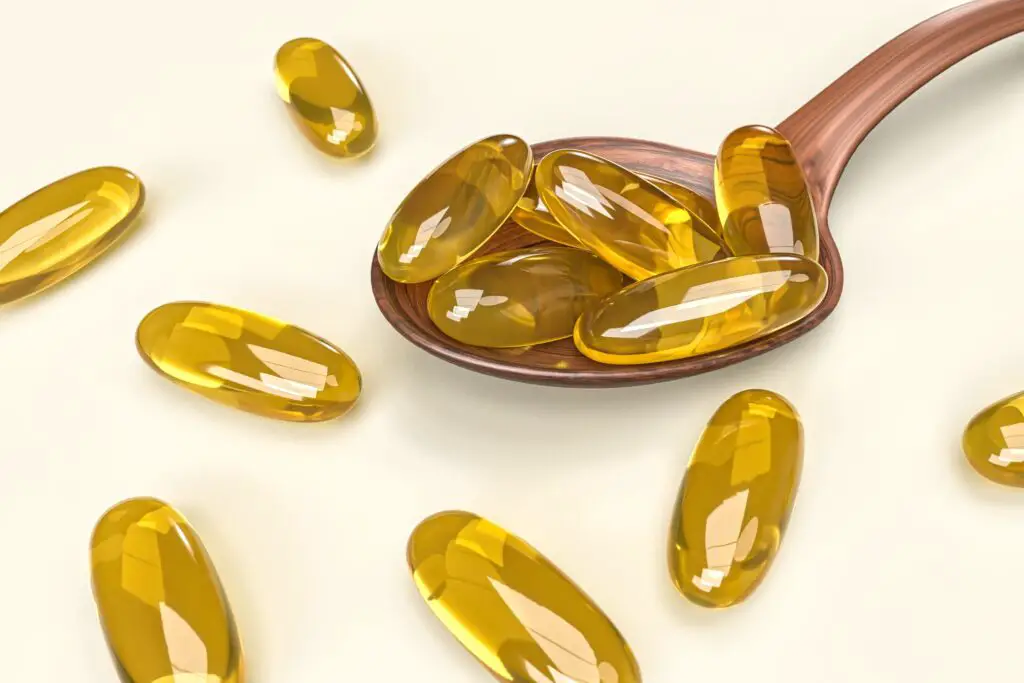
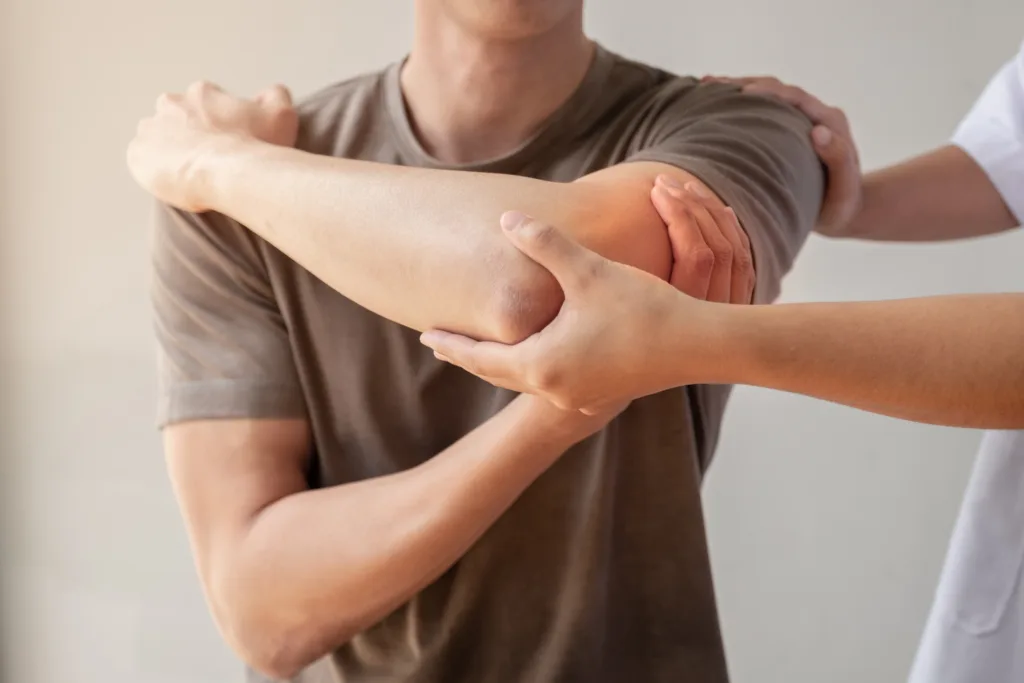
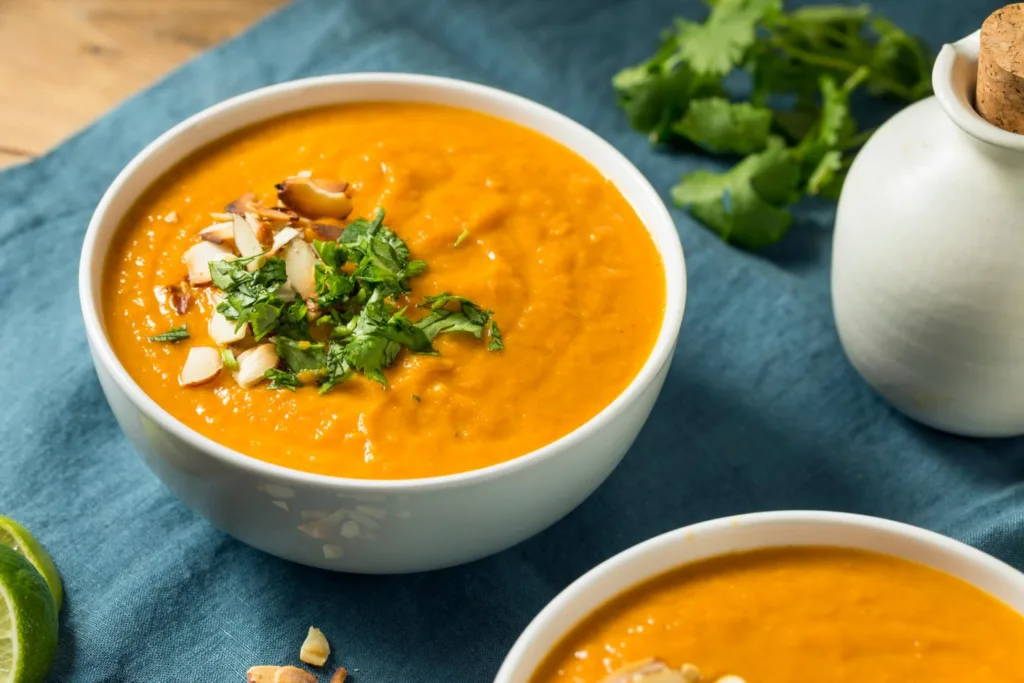
Comments
0